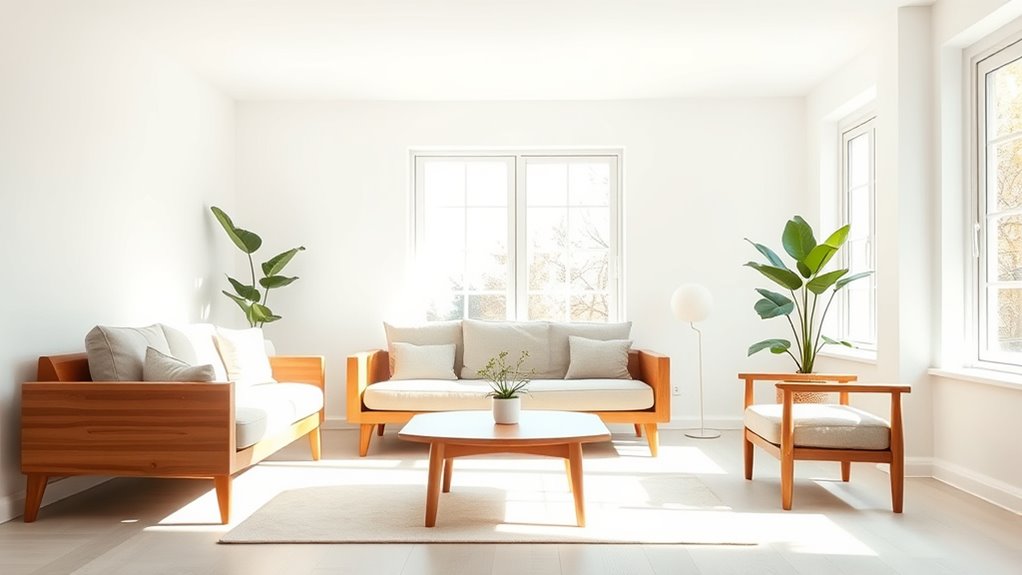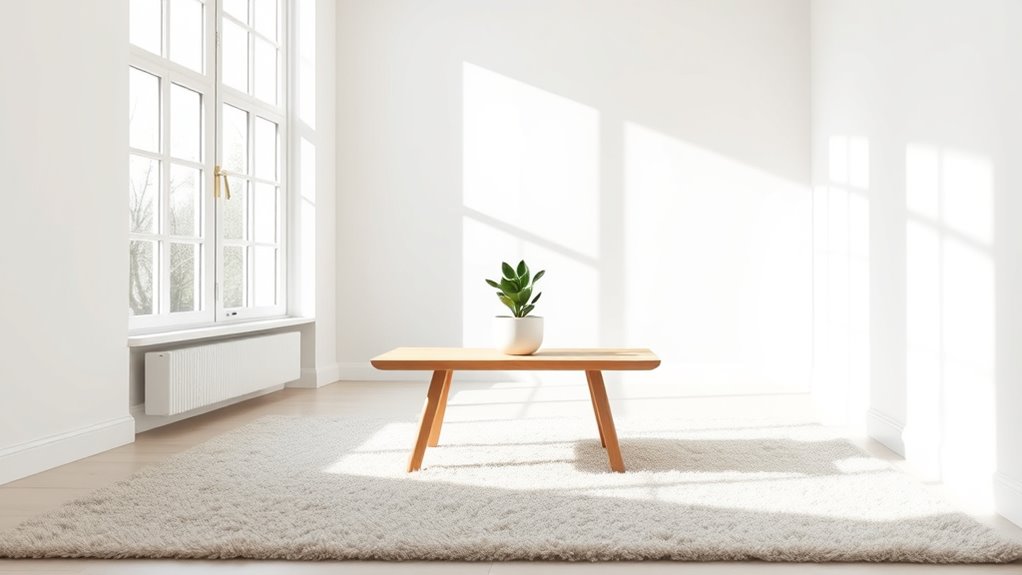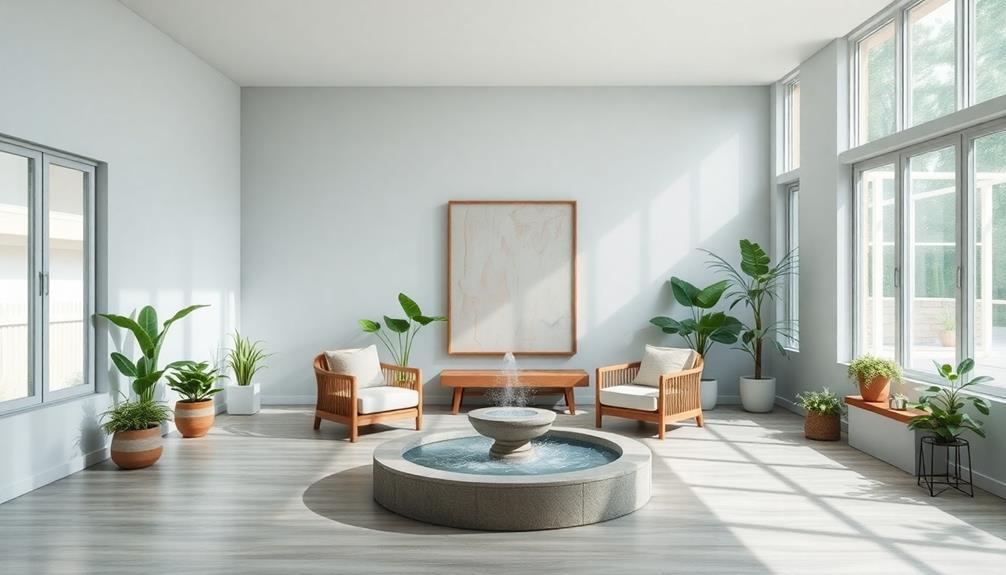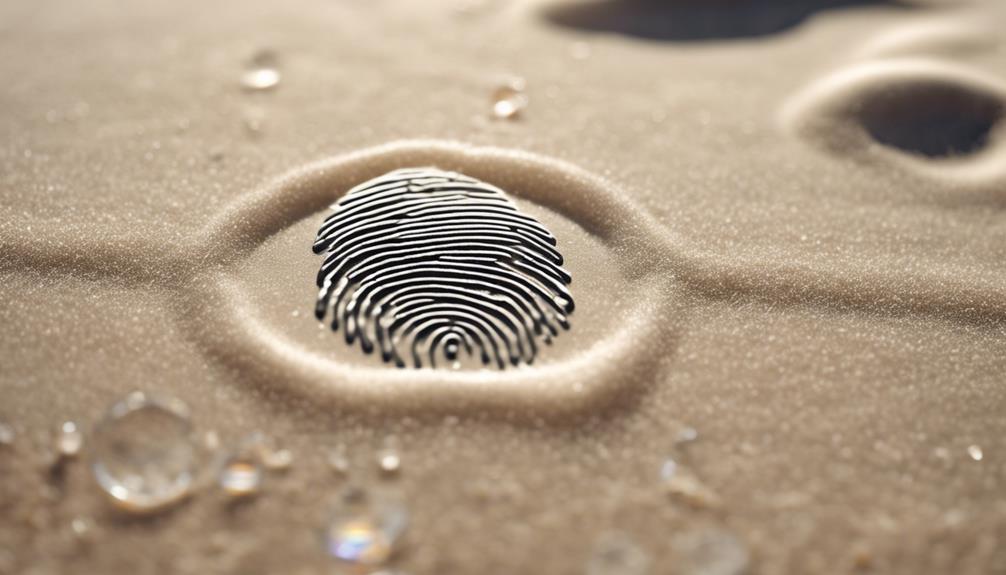Living in a minimalist space helps clear your mind by reducing visual clutter and creating a calm environment. Research shows that fewer decorations and distractions lower stress hormones like cortisol, making it easier to focus and think clearly. This simplicity also boosts your sense of control and mindfulness, helping you prioritize what truly matters. Keep exploring how these small changes can lead to a more peaceful, focused life.
Key Takeaways
- Minimalist spaces reduce visual clutter, decreasing mental overload and enhancing focus.
- Simplified environments lower cortisol levels, contributing to stress reduction and emotional well-being.
- Fewer decorative items streamline decision-making, freeing mental energy for important tasks.
- Clutter-free areas promote mindfulness and present-moment awareness, improving mental clarity.
- Scientific studies link reduced clutter with better concentration and decreased anxiety levels.

Minimalist living spaces have gained popularity because they offer a simple, clutter-free environment that promotes peace and focus. When you choose decor minimalist, you’re intentionally stripping away excess and emphasizing essential items that bring you joy or serve a purpose. This approach not only creates a visually calming space but also encourages clutter reduction, which has a direct impact on your mental clarity. A cluttered environment can overwhelm your senses, making it harder to concentrate and increasing stress levels. By simplifying your surroundings, you allow your mind to breathe, leading to improved focus and emotional well-being.
Choosing minimalist decor fosters calm, reduces clutter, and enhances mental clarity and emotional well-being.
When you adopt minimalist decor, you’re actively removing distractions that can clutter your thoughts. Instead of filling your space with numerous decorative pieces or unnecessary furniture, you select only a few meaningful items. This intentional curation reduces visual noise, helping your brain process information more efficiently. Research shows that environments with less visual clutter can decrease cortisol levels, the hormone associated with stress, and enhance your ability to concentrate. As you reduce clutter, you also minimize the mental energy spent on managing or cleaning excess belongings, freeing up cognitive resources for more important tasks or personal growth.
Clutter reduction isn’t just about tidiness; it’s about creating a mental space that fosters clarity. When your environment aligns with your desire for simplicity, it becomes easier to prioritize and focus on what truly matters. You might notice that your decision-making sharpens, and your ability to stay present improves. The act of maintaining a minimalist space encourages mindfulness, as you become more aware of your possessions and their relevance to your life. This awareness can translate into better mental organization and reduced feelings of being overwhelmed.
Furthermore, minimalist living spaces often promote a sense of control and intentionality. You decide what to keep, what to discard, and how to arrange your environment in a way that supports your mental health. This process can be empowering, giving you a clearer perspective on your priorities and reducing anxiety caused by chaos or excess. When your space is aligned with your need for calm and order, it becomes a sanctuary that nurtures mental clarity rather than chaos. Additionally, reducing clutter can be linked to decreased stress hormones, further supporting mental well-being.
Frequently Asked Questions
How Quickly Can Mental Clarity Improve After Decluttering?
You might notice improvements in mental clarity within days after decluttering. Removing visual clutter reduces mental distraction, helping you focus better and feel calmer. As soon as you clear your space, your mind can breathe easier, and stress levels often drop quickly. While everyone’s experience varies, many find that even small decluttering efforts lead to significant mental clarity gains in just a few days.
Are There Specific Minimalist Designs That Enhance Focus?
Ever wonder which minimalist designs sharpen your focus? Certain styles, like clean lines combined with strategic lighting design, can do wonders. Incorporate soothing colors based on color psychology—think soft blues or greens—to create a calming environment. Well-placed lighting not only illuminates but also guides your attention. Together, these elements craft a space that naturally enhances concentration, making your environment a powerful tool for mental clarity.
Does Minimalist Living Affect Sleep Quality?
Minimalist living can improve your sleep quality by reducing clutter and creating a calming environment. By choosing simple decorative accessories and neutral color schemes, you promote relaxation and minimize distractions before bedtime. You’ll find it easier to unwind in a space that feels organized and peaceful. This intentional design approach helps signal your brain that it’s time to rest, leading to better sleep and overall mental clarity.
Can Minimalism Reduce Stress in High-Pressure Environments?
Research shows that 60% of people report feeling less stressed in minimalist environments. In high-pressure settings, adopting minimalism can markedly improve your stress management by reducing clutter and distractions. This clarity helps you stay focused, boosting productivity enhancement. By creating a calmer space, you lower anxiety levels, making it easier to handle demanding situations. Minimalist living empowers you to maintain mental clarity and resilience under pressure.
What Are Common Challenges in Adopting Minimalist Lifestyles?
When you try adopting a minimalist lifestyle, you often face challenges like clutter management and decision fatigue. You might struggle with letting go of possessions or making consistent choices about what to keep. These hurdles can feel overwhelming at first, but by setting clear goals and creating routines, you can gradually simplify your space. Over time, managing clutter becomes easier, helping you enjoy the mental clarity that minimalism offers.
Conclusion
Imagine walking into a clean, bright room where every item has a purpose, and clutter no longer weighs on your mind. Minimalist living spaces clear the chaos, letting you breathe easier and think sharper. As research shows, simplicity sparks mental clarity, so you can focus on what truly matters. Embrace the calm, open space around you, and feel your stress melt away—your mind will thank you for it.









